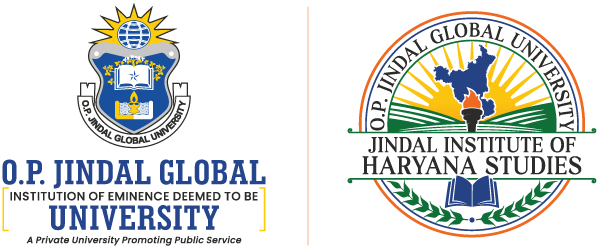About JIHS
O.P. Jindal Global University (JGU) has been able to carve a special place for itself in the history of the state of Haryana. JGU was the first private university established under the Haryana Private Universities Act 2006. On becoming an Institution of Eminence the Act of 2006 was accordingly amended. JGU has been consistently achieving top positions in QS rankings across disciplines. As the University celebrates these achievements in the 15-year journey of the university, it honours Haryana, its host, by establishing a new research institute – the Jindal Institute of Haryana Studies (JIHS). While Haryana has achieved remarkable progress in various sectors since its formation as a separate state of the Indian Republic on November 1, 1966, it continues to face challenges related to governance, social equity, environmental sustainability, and economic diversification. JIHS aims to advance Haryana’s development agenda while aligning with global best practices and sustainable development goals.
JIHS is dedicated to highlighting Haryana’s achievements and addressing Haryana’s unique challenges through interdisciplinary research, innovative policy solutions, capacity-building initiatives, and actionable intervention.
Haryana was formed as a separate state of the Indian Republic on November 1, 1966. Haryana is among the top 15 states in Gross State Domestic Product (GSDP) and the top 5 per capita GSDP. At its inception, the state was principally an agrarian economy. The sectoral share of agricultural and allied activities to the GSDP in 1969-70 was around 61 percent, while those of industry and services were around 22 percent and 18 percent, respectively. By 2023-24, these shares shifted to 16 percent for agricultural and allied activities, 33 percent for indust ries, and 51 percent for services. Development in education, sports, and the automobile industry developments have accompanied this structural transformation.

While Haryana has achieved remarkable progress in various sectors, it continues to face challenges related to governance, social equity, environmental sustainability, and economic diversification. The JIHS will aim to advance Haryana’s development agenda while aligning with global best practices and sustainable development goals (SDGs).
Even as the state makes commendable strides towards higher growth and enhanced development, there remains enormous potential in areas like moving towards sustainable agriculture, industrial development, adoption of renewable energy, and investment in IT, to name a few, which act as the channels of achieving more equitable growth. Accordingly, the Institute will work towards strengthening Haryana’s industrial, agricultural, and entrepreneurial ecosystems, fostering sustainable economic growth and employment generation.
Apart from the above, some pressing development challenges remain for the state. Be it the increasing environmental degradation, persisting socio-economic inequalities, within-state disparities, and steadily declining groundwater levels. JIHS will act as a nodal centre for conducting interdiscip linary, data-driven research that addresses Haryana’s socio-economic, environmental, and governance challenges. It will strive to create frameworks for policy and legal reforms to promote good governance and institutional accountability.
JIHS will develop strategies for improvement in education, health, and human development indicators to help Haryana align its development policies and planning with the global SDG frameworks to ensure sustainable, equitable, and just growth. The Institute will be committed to designing policies to empower marginalised communities, including women, youth, farmers, and vulnerable groups, through targeted interventions.
Despite its economic significance, Haryana lacks an interdisciplinary research institute dedicated to its unique challenges and opportunities. The JIHS will fill this gap by undertaking research initiatives to understand the state better, proposing recommendations that place it on a higher development path. The Institute will remain an independent, non-partisan research institute housed in the University, serving as a knowledge hub dedicated to addressing the concerns and challenges of the state of Haryana.
Vision
JIHS aims to conduct meaningful, policyoriented, interdisciplinary research to foster inclusive growth by focusing on marginalised population groups. JIHS is dedicated to designing impactful and transformative solutions for Haryana’s economic, social, environmental, governance, and legal challenges. JIHS main goals (not exhaustive) are
